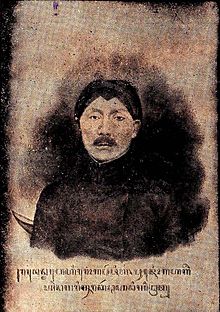| Raden NgabehiRanggawarsita | |
|---|---|
| ꦫꦢꦺꦤ꧀ꦔꦧꦺꦲꦶꦫꦺꦴꦁꦒꦮꦂꦰꦶꦠ | |
 | |
| Pronunciation | |
| Born | Bagoes Boerhan (1802-03-14)14 March 1802 Surakarta Sunanate, Dutch East Indies |
| Died | 24 December 1873(1873-12-24) (aged 71) Surakarta Sunanate, Dutch East Indies |
| Resting place | Ranggawarsita Graveyard, Palar, Trucuk, Klaten Regency 7°42′27″S 110°40′47″E / 7.707535°S 110.6797339°E / -7.707535; 110.6797339 |
| Occupation | Poet |
| Years active | 1845-1873 |

Raden Ngabehi Ranggawarsita (14 March 1802 – 24 December 1873, Javanese: ꦫꦢꦺꦤ꧀ꦔꦧꦺꦲꦶꦫꦺꦴꦁꦒꦮꦂꦰꦶꦠ, romanized: Raden Ngabehi Ronggawarsita, Javanese pronunciation: [radɛn ŋabɛhi rɔŋgɔ warsitɔ]) was a Javanese philosopher and poet. He was born into the famous literary Yasadipura family in Surakarta, in Central Java. He is sometimes called the last Javanese poet.
Biography
Ranggawarsita was born in 1802 with the birth name Bagus Burhan. He was son of Mas Pajangswara and grandson of Yasadipura II, a famous poet of Surakarta Sunanate. His father was the offspring of the Kingdom of Pajang, his mother of the Demak Sultanate. Once reaching adulthood, Ranggawarsita quickly gained a reputation for his intellectual capabilities which included authoring poetry, grammar books, and working as a redactor for the Dutch periodical Bromartani.
Works
Ranggawarsita authored numerous texts that covered a myriad of subjects which included poetry, mysticism, and ethics. Additionally, his works included prophecies as well as criticism of the politics and society of his time.
Some of his notable works included:
- Serat Wirit Sopanalya
- Serat Candrarani
- serat Kalatidha (A dark time)
- Sapta dharma
- Sri Kresna Barata
- Paramayoga
- Pustakaraja Purwa
- Wirid Hidayat Jati
Several works by Ranggawarsita were republished posthumously by Tan Khoen Swie of Kediri in the early 20th century.
Legacy
There is a museum in his name in Semarang.
Notes
- All of his works always written as Ronggawarsita, not Ranggawarsita
References
- The last pujangga or babad creator in Javanese culture, is often ascribed to Ranggawarsita
- ^ Riddell, Peter G. (2001). Islam and the Malay-Indonesian World: Transmission and Responses. Hurst. pp. 181–182. ISBN 978-1-85065-336-3.
- Anthony Day Ranggawarsita's prophecy of mystery in Wyatt, David K; Aung-Thwin, Michael; Woodside, Alexander; Joint Committee on Southeast Asia (1982), Moral order and the question of change : essays on Southeast Asian thought, Yale University Southeast Asia Studies, ISBN 978-0-938692-02-7
- Seminar Nasional Pengaruh Karya Sastra R. Ng. Ronggawarsita Terhadap Ipoleksosbud (2012 : Surakarta, Indonesia); Universitas Sebelas Maret. Jurusan Sastra Daerah (organizer.); Karya Sinema Nusantara Jakarta (organizer.) (2012), Prosiding Seminar Nasional Pengaruh Karya Sastra R. Ng. Ronggawarsita Terhadap Ipoleksosbud, Jebres, Surakarta Graha Aksara, ISBN 978-602-18-5500-3
{{citation}}: CS1 maint: numeric names: authors list (link) - Sawega, Ardus M (6 April 2002). Peran Kebudayaan Tan Khoen Swie [The Cultural Role of Tan Khoen Swie] (in Indonesian). Archived from the original on 9 September 2005.
{{cite book}}:|work=ignored (help) - Griffiths, Arlo (2012), "The epigraphical collection of Museum Ranggawarsita in Semarang (Central Java, Indonesia)" (PDF), Journal of the Humanities and Social Sciences of Southeast Asia and Oceania, 168 (4), Royal Netherlands Institute of Southeast Asian and Caribbean Studies (published 2012-10-01): 472–496, doi:10.1163/22134379-90003553, ISSN 0006-2294, S2CID 129812820
External links
- Works by Ranggawarsita at LibriVox (public domain audiobooks)
